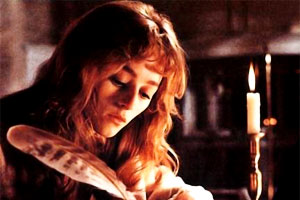
I intend to make a film about the
joy of living. The characters are people who, beyond the issue of
romance, seek to live intensively, typical of young people like
them. I see them as people with the necessary courage and intensity
to live outside the existing conventions and norms of society.
There lies the whole monstrosity. This begs a question: Can the joy
of living be exercised with impunity? That is why, after creating
the story, that is to say "the monster", the lives of all the
players turn a little more tragic [...]
When I was 16 years old, I read
"Frankenstein", but to tell the truth It was not a novel that took
up much space in my memory. However, what occurred to me suddenly
was to play around with the idea of Mary as the creator of the
monster, of the Creature, as I like to call it, and about how a
twenty-year-old woman creates the sort of character that emerges
from the book's pages.
What one will never know for sure
is if the creature represents the premonitory symptom of what is
going to happen, or if it is the creature itself that intervenes
and causes the destruction. I am inclined to believe that the first
of these two possibilities is more likely, but it shouldn't be
ruled out that thoughts are very powerful and have a strong
influence in our characters' lives. In fact, I am sure about it.
And it is obvious that Mary feels responsible for the misfortunes
that occur. I think that perhaps she is too egocentric. I suspect
that the world didn't rotate around her to the extent that she
might have caused the whole tragedy [...]
Instead of doing a film along the
lines of a nineteenth century novel describing people's lives and
characters, I have preferred to concentrate on a particular
element, the monster, as something that was sort of incarcerated
inside the characters and which appears and coincides with that
degradation that is evasively outlined in the movie: Mary's
jealousy, the separation of Byron and Clara, etc.
GONZALO SUÁREZ.